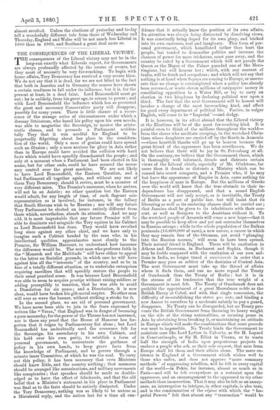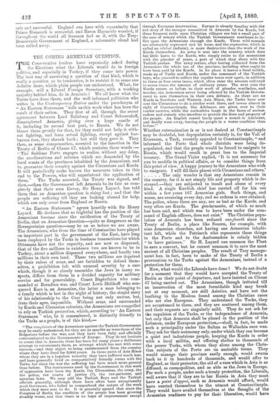THECONSEQUENCES OF THE LIBERAL VICTORY.
THE consequences of the Liberal victory may not be in the long-run exactly what Liberals expect, for Governments are always profoundly affected by the course of events, but they must of necessity be very far-reaching. To begin with home affairs, Tory Democracy has received a very severe blow. We do not say that it is dead, for we are not blind to the fact that both in America and in Germany the masses have shown a certain readiness to fall under its influence, but it is, for the present at least, in a dead faint. Lord Beaconsfield must go out ; he is unlikely, from his great age, to return to power ; and with Lord Beaconsfield the influence which has so perverted the great and necessary Conservative party will disappear, possibly for many years. There is little chance of a recur- rence of the strange series of circumstances under which a dreamy litterateur, who based his policy upon his own novels, was able to magnetise the Sovereign, to master the aristo- cratic classes, and to persuade a Parliament acciden- tally Tory that it was needful for England to be perpetually fidgetting about her place in the considera- tion of the world. Only a man of genius could have spread such an illusion ; only a man anxious for glory in Asia rather than in Europe could have avoided the collision with hard facts which would have speedily disenchanted the people ; and only at a moment when a Parliament had been elected in his name, but for other ends, could he have secured the neces- sary control over the great machine. We are not likely to have Lord Beaconsfield, the Eastern Question, and a bad Parliament all together again, and without any one of them Tory Democracy, should it revive, must be a monster of very different mien. The Premier's successor, when he arrives, will not be an Asiatic; no other question but the Eastern would admit, for any length of time, of such flagrant mis- representation as is involved, for instance, in the fallacy that South Slavons wish to be Russian ; nor will any future Tory Parliament be elected on issues entirely different from those which, nevertheless, absorb its attention. And we may add, it is most improbable that any future Premier will be able to dominate and misguide the Tory squires in his Cabinet as Lord Beaconsfield has done. They would have revolted long since against any other chief, and we have only to imagine such a Cabinet headed by the man who, in his intellectual qualities, approximates most closely to the Premier, Sir William Harcourt, to understand how immense the difference would be. The next man who professes faith in the "Monarch and the Multitude" will have either to appeal to the latter on Socialist grounds, in which case he will have against him all the " interests " of the country, and so be in face of a totally different situation, or to undertake enterprises requiring sacrifices that will speedily restore the people to their usual practical sense. It was because Lord Beaconsfield was able to seem to acquire prestige without raising soldiers or adding perceptibly to taxation, that he was able to avoid a Dissolution for six years ; and a Dissolution, it is now clear, would have broken his gilt-metal sceptre. No other man will ever so wave the banner, without striking a stroke for it.
In the second place, we are rid of personal government. We have never been able to join in the fears expressed by writers like " Verax," that England was in danger of becoming a pure monarchy, for the power of the Throne has not increased, nor is there any proof that the House of Hanover has for- gotten that it reigns by Parliamentary fiat alone ; but Lord Beaconsfield has undoubtedly used the reverence felt for the Sovereign, his ascendancy in his own Cabinet, and his hold over his own party, to establish a form of personal government, to concentrate the guidance of policy in his own hands, to keep grave facts from the knowledge of Parliament, and to govern through a minute inner Committee, of which he was the soul. To carry out this policy, it has been necessary that even Ministers should know little, and the country nothing ; that measures should be arranged like assassinations, and military movements like conspiracies ; that speeches should be made so double- edged as to have the effect of falsehoods, and that the old belief that a Minister's statement in his place in Parliament was final as to the facts should be entirely dissipated. Under the Tory Democracy, nothing was so likely to be untrue as a Ministerial reply, and the nation lost for a time all con- fidence that it actually knew the position of its own affairs. Its attention was always being distracted by dissolving views. It was constantly being duped for its own glory, and tricked into its own successes, real and imaginary. This form of per- sonal government, which humiliated rather than hurt the people, but tended to demoralise politics and increase the chances of power for mere tricksters, must pass away, and the country be ruled by a Government which will not parade the Queen as the Mayor of the Palace paraded one of the Mero- vingians, but will honour her ; which, with any amount of faults, will be frank and scrupulous; and which will not say that nothing is at hand when Sepoys are coming to Europe, or asseve- rate that no change is contemplated when a policy has already been reversed, or waste eleven millions of ratepayers' money in conciliating opposition to a Water Bill, or try to carry an election in two kingdoms by declaring political war upon a third. The fact that the next Government will be honest will involve a change of the most far-reaching kind, and affect for good every department of political life. Parties, in vulgar English, will cease to be "Imperial "—and dodgy.
It is, however, in its effect abroad that the Liberal victory at the Elections will be of the most far-reaching kind. It is painful even to think of the millions throughout the world— from the slaves who meditate escaping, to the wretched Chris- tians whose daughters are carried off by the Kurds in Armenia —whose heartfelt thanks will go up to heaven because the great friend of the oppressors has been overthrown. We do not believe that there will be joy in St. Petersburg at all. On the contrary, we believe that the Government there, which is thoroughly well informed, dreads and distrusts certain views of the Liberal chiefs, especially of Mr. Gladstone, far more than it dreads or distrusts a Ministry which can be coaxed into secret compacts, and a Premier who, if he may but have the appearance of Empire in Asia, cares nothing for the happiness of man in Europe. But the millions of Greeks over the world will know that the true obstacle to their in- dependence has disappeared, and that a sound English Government will not only accept, as is inevitable, the Treaty of Berlin as a part of public law, but will insist that its liberating as well as its enslaving clauses shall be carried out ; that Jannina shall be given to its inhabitants with their con- sent, as well as Serajevo to the Austrians without it. To the wretched people of Armenia will come a new hope—that it may be possible to keep alive and yet not surrender themselves to Russian satraps ; while to the whole population of the Balkan peninsula (16,000,000 of men), a new career, a career in which they may remain free of the Ottoman, yet avoid "plunging into the Russian morass," will seem to have been opened. Their natural friend is England. There will be exultation in Athens and Erzeroum, in Bucharest and Sophia, though it may be feeble compared with the exultation of our own mil- lions in India, no longer taxed a miserieorde in order that a Premier may pose as arbiter of the destinies of Central Asia. The next Government must take up the thread of affairs where it finds them, and can no more repeal the Treaty of Gundamuk than the Treaty of Berlin ; but it is in the stream of its tendencies that the true weight of a Government is most felt. The Treaty of Gundamuk does not prohibit the appointment of a great Mussulman noble as the British Envoy at Cabul, and with that single concession, the difficulty of re-establishing the status quo ante, and binding a new Ameer to ourselves by a moderate subsidy to pay a guard, disappears. No Treaty can be disregarded, but no Treaty pre- vents the British Government from throwing its heavy weight on the side of the rising nationalities, or securing peace in Asia by abstaining from breaking it, or maintaining an attitude in Europe which will make the combinations that must precede war next to impossible. No Treaty binds the Government to maintain men like Lord Lytton in Calcutta, or Sir H. Layard in Constantinople, or Sir H. Elliot in Vienna, or to waste half the strength of India upon preposterous projects to enslave a people who ask, as their sole request, that men from Europe shall let them and their affairs alone. The mere ex- istence in England of a Government which wishes well to those who suffer, and does not approve "more summary methods" of suppressing rebellion, will be felt in every capital of the world—in Pekin, for instance, almost as much as in Paris—and will be felt everywhere as a restraint upon the oppressors, and an encouragement to the oppressed to try other methods than insurrection. That it may also be felt as an annoy- ance, an interruption to intrigue, in other capitals, is also true, and is the condemnation of the rigime with which the "Im- perial Powers" felt that almost any " transaction " would be safe and successful. England can hear with equanimity that Prince Bismarck is sorrowful, and Baron Haymerle worried, if throughout the world all freemen feel as if, with the Tory- Democratic Government of England, a miasmatic cloud had been rolled away.



































 Previous page
Previous page